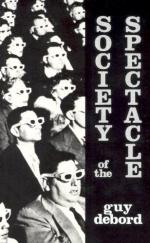
|
| Name: _________________________ | Period: ___________________ |
This test consists of 15 multiple choice questions and 5 short answer questions.
Multiple Choice Questions
1. Through production, Debord sees the economy is based on __________.
(a) Quantitative development.
(b) Under-development.
(c) Over-development.
(d) Qualitative development.
2. What does the spectacle accumulate to the point where it becomes an image in Chapter 1?
(a) Time.
(b) Need.
(c) Capital.
(d) Hope.
3. Dictatorships must be attended by permanent what, according to Debord?
(a) Freedom.
(b) Violence.
(c) Antagonism.
(d) Unity.
4. In the beginning of Chapter 2, Debord refers to commodity as what?
(a) Statesman.
(b) Old friend.
(c) Sorcerer.
(d) Old enemy.
5. The abundance of commodity is no more than _____________, according to Chapter 2.
(a) Survival supplemented.
(b) Augmented survival.
(c) Super-survival.
(d) Survival negated.
6. What year did Marx's revolution fail?
(a) 1856.
(b) 1824.
(c) 1848.
(d) 1863.
7. What is the pivotal issue that Debord thinks is ignored in revolutionary theory?
(a) Production.
(b) Military.
(c) Organization.
(d) Longevity.
8. In thesis 4, images _________ the spectacle.
(a) Represent.
(b) Distort.
(c) Mediate.
(d) Clarify.
9. What is the negative form of the consciousness of desire, in Debord's opinion?
(a) Loss of history.
(b) Loss of self.
(c) Abolition of classes.
(d) Devalue of time.
10. According to Debord, each new product is supposed to offer a shortcut to the promised land of what?
(a) Satisfaction.
(b) Power.
(c) Consumption.
(d) Freedom.
11. When does Debord believe new products evaporate into vulgarity?
(a) In a consumer's home.
(b) In the harsh light of reality.
(c) In a consumer's imagination.
(d) In the spectacle's light.
12. The Bourgeois Era was eager to give history what kind of foundation?
(a) Political.
(b) Scientific.
(c) Religious.
(d) Economic.
13. In thesis 13, the spectacle is essentially what?
(a) Illogical.
(b) Systematic.
(c) Tautological.
(d) Symantic.
14. What is an illusion of production in thesis 27?
(a) Time.
(b) Leisure.
(c) Purpose.
(d) Productivity.
15. In Chapter 3, the spectacle is the epic strife that no fall of ______ can bring to an end.
(a) Ilium.
(b) Daedeus.
(c) Apollo.
(d) Hercules.
Short Answer Questions
1. In thesis 13, Debord compares the spectacle to what?
2. In thesis 35, the commodity abounds in ____________subtleties.
3. Fads make the commodity more and more what, according to Debord?
4. The commodity is valued as what, in Chapter 3?
5. According to thesis 42, the entirety of what is transformed into the total commodity?
|
This section contains 326 words (approx. 2 pages at 300 words per page) |

|




